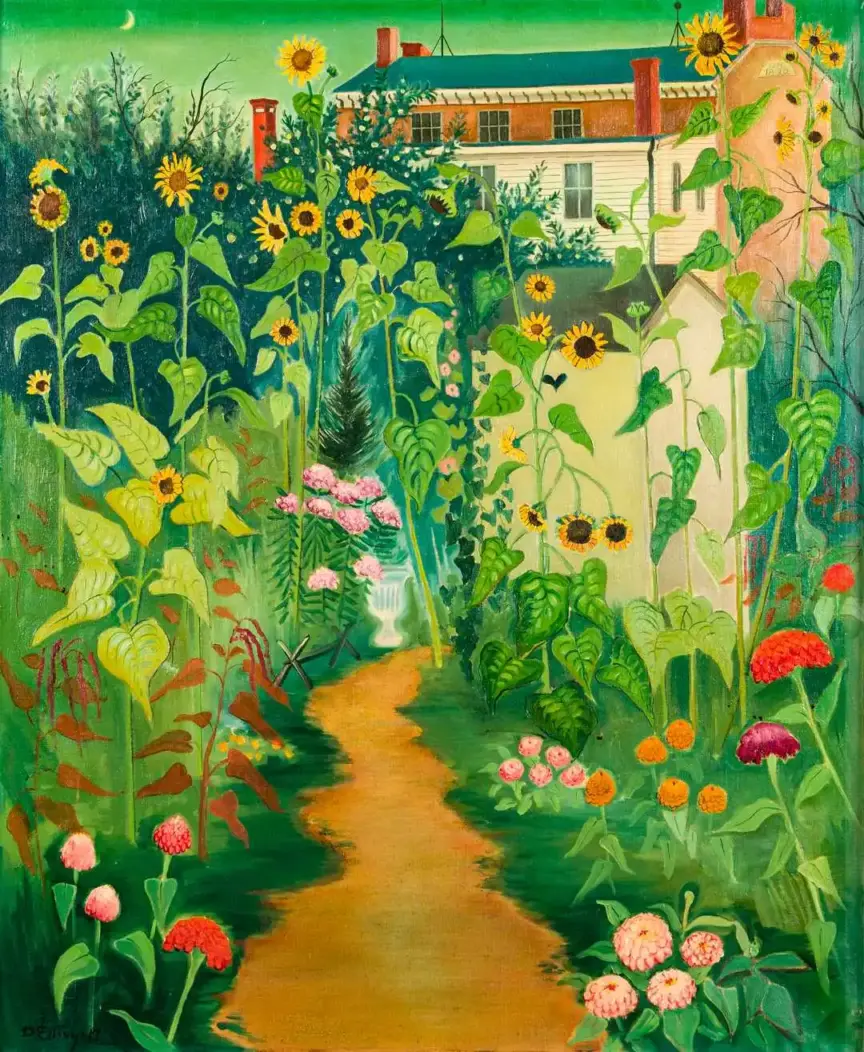February 3–April 17, 2022
Harrison Gallery

Arcadia Exhibitions is pleased to present “Out of the Heart: The Life and Art of David Ellinger.” Featuring a selection of 60 works and related documentation, this survey explores the creative production of Pennsylvania native, self-taught artist, and antiques dealer David Y. Ellinger (1913–2003) who helped popularize Pennsylvania German culture in the mid-1900s. Curated by Lisa Minardi, executive director of Historic Trappe, the show was developed in conjunction with “Polly Apfelbaum: For the Love of Una Hale” an exhibition of new ceramic works and site-specific wallpapers referencing the influence of Pennsylvania German craft traditions on Apfelbaum’s hybrid sensibility. Both exhibitions remain on view (at the campus galleries in University Commons and Spruance Art Center) from February 3 through April 17, 2022.
“Out of the Heart” is titled after one of Ellinger’s best known canvases, Out of the heart comes the issues of life (1943), which he based on Proverbs 4:23 (“keep thy heart with all diligence, for out of it are the issues of life”). One of nearly two dozen paintings in the exhibition, it is joined by prints, drawings, theorems (paintings on velvet), and examples of fraktur, cut paper, and painted wood (a chest and boxes). The range of media and diversity of approaches—from impressionistic landscapes to interpretations of the more graphic idioms of Pennsylvania German folk art—demonstrate Ellinger’s evolution as an artist as well as his other career as a successful antiques dealer.
Presented in the Harrison Gallery of Arcadia’s University Commons, the show is divided into three sections: early life, focusing on Ellinger’s earliest known artworks and his involvement with the Works Progress Administration; farm life, which explores his paintings of Pennsylvania German farmsteads and barns; and home life, delving into Ellinger’s paintings of household interiors, Amish quilts, and flower gardens. The exhibition also includes ephemera, including the artist’s palette and documentation of his persona as a female impersonator, who from approximately 1939 to 1953 performed as Una Hale, a stage name that appears in the title of Apfelbaum’s exhibition in homage to Ellinger and the freedom represented by his life and work.
Among some the more significant items in the exhibition are silkscreen prints made in collaboration with Frances Lichten taken from his experience drawing objects in museum collections during the 1930s while working for the WPA. Other highlights include paintings depicting bank barns and auctions, a sketchbook containing nearly 400 drawings, and wallpaper designs made in 1927 when Ellinger was fourteen years old.
Curated independently of the Apfelbaum exhibition, “Out of the Heart: The Life and Art of David Ellinger” nevertheless includes examples of Ellinger’s work that will inform visitors’ experience of Apfelbaum’s ceramic works and wallpapers, in particular his Tobacco Barn (or Yellow Barn), paintings depicting quilts, and a canvas representing a bonneted woman with a green watering can. Together, the two exhibitions serve to demonstrate the formative influence of Pennsylvania German folk art on different but parallel sensibilities.
Major support for “Polly Apfelbaum: For the Love of Una Hale” and “Out of the Heart: The Life and Art of David Ellinger” has been provided by The Pew Center for Arts & Heritage, with additional support from Creative Capital.
About David Ellinger
A Pennsylvania native and self-taught artist, David Y. Ellinger (1913–2003) helped popularize Pennsylvania German culture in the mid-twentieth century through his paintings of Amish farmsteads, bank barns, country auctions, and other scenes of rural life. He drew on his personal experience growing up in the vicinity of Trappe, in Montgomery County, where he worked on a dairy farm as a teenager. He also incorporated antique furniture, quilts, chalkware, and other objects into his paintings—taken from his experience drawing objects in museum collections during the 1930s while working for the WPA, first as part of the Federal Art Project and then for the Index of American Design. Ellinger was also an antiques dealer, buying and selling antiques to major collectors such as Albert Barnes, Titus Geesey, and Donald Shelley. He also revived the nineteenth-century art of theorem painting and made hundreds of examples—mostly still lifes depicting baskets of fruit—that are still highly prized today by collectors. Ellinger worked in a wide variety of media, including oil, casein, watercolor, and crayon. Earlier in his life, Ellinger was also a drag performer known as Una Hale.
About Lisa Minardi
Lisa Minardi is a noted scholar of Pennsylvania German art and the executive director of Historic Trappe, home to the Center for Pennsylvania German Studies. Her previous exhibitions include “A Colorful Folk: Pennsylvania Germans and the Art of Everyday Life” (Winterthur, 2015); “Quill & Brush: Pennsylvania German Fraktur and Material Culture” (Free Library of Philadelphia, 2015); and “Pastor & Patriots: The Muhlenberg Family of Pennsylvania” (Philip and Muriel Berman Museum of Art at Ursinus College, 2011). She is the author of numerous books, articles, and essays on Pennsylvania German art and culture including Drawn with Spirit: Pennsylvania German Fraktur from the Joan and Victor Johnson Collection (Philadelphia Museum of Art, 2015).
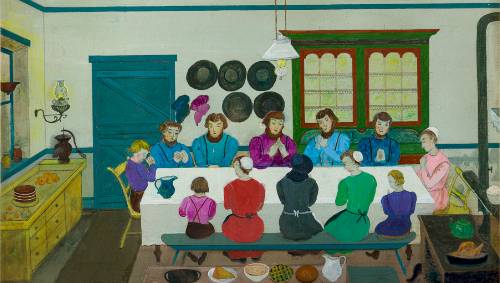
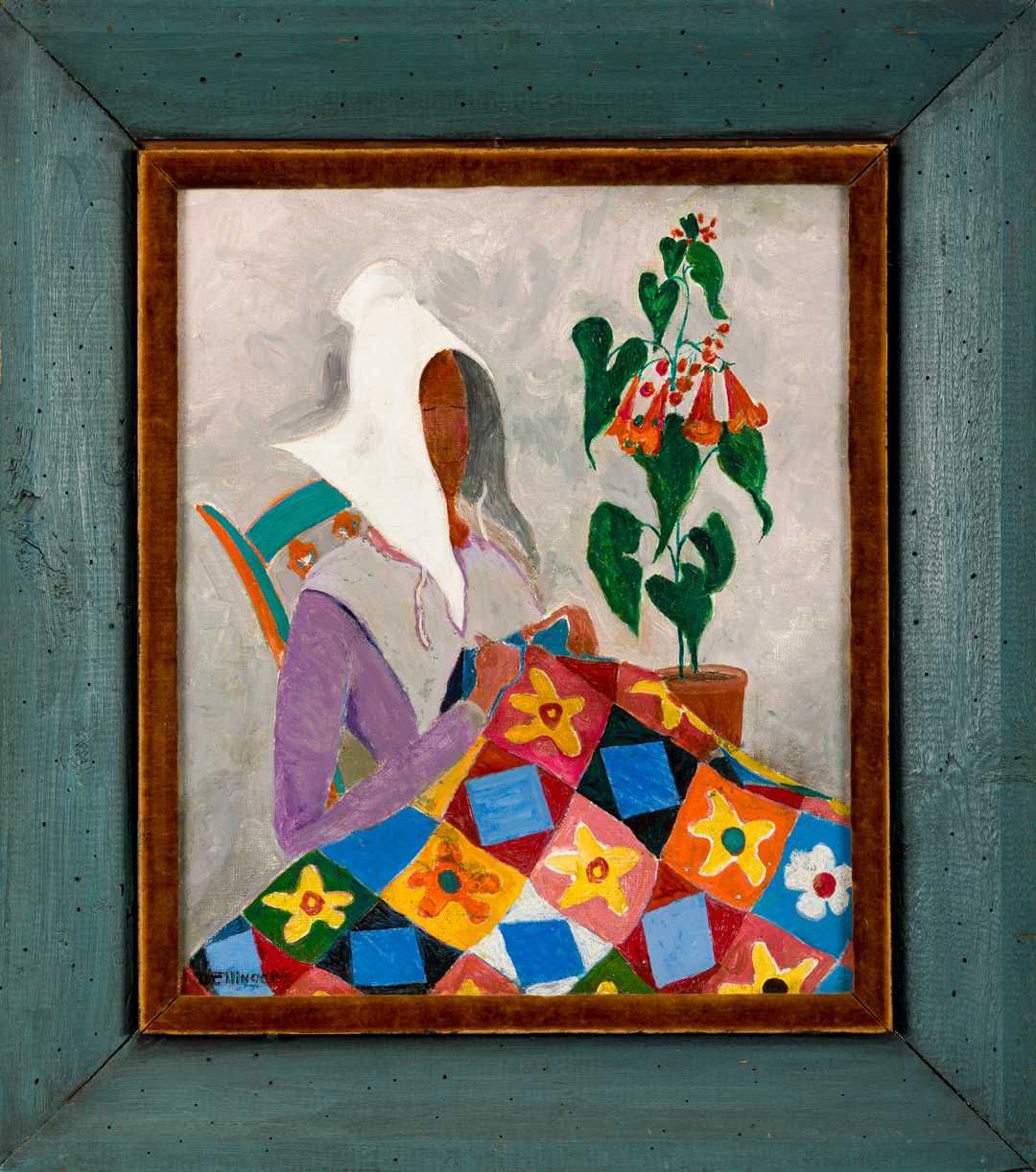
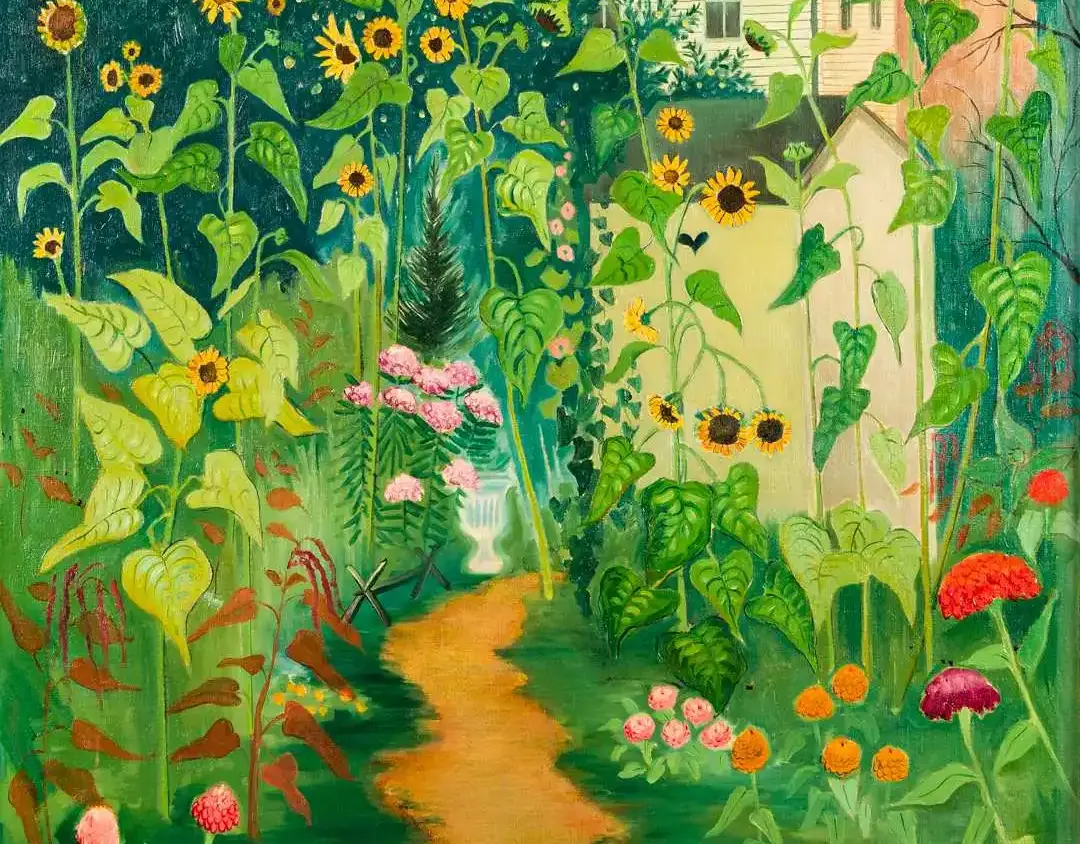
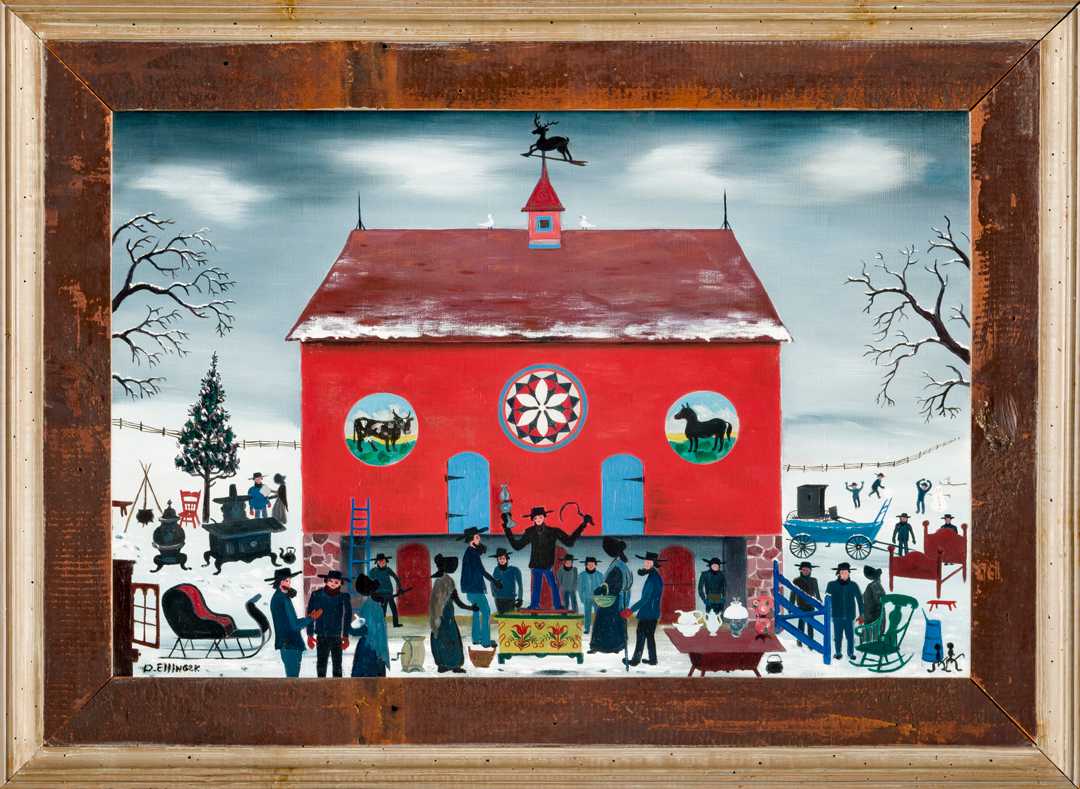
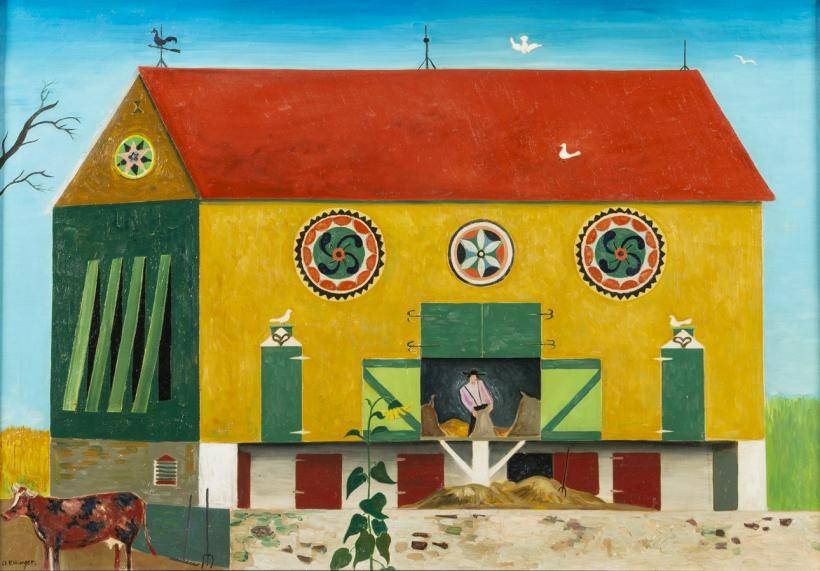
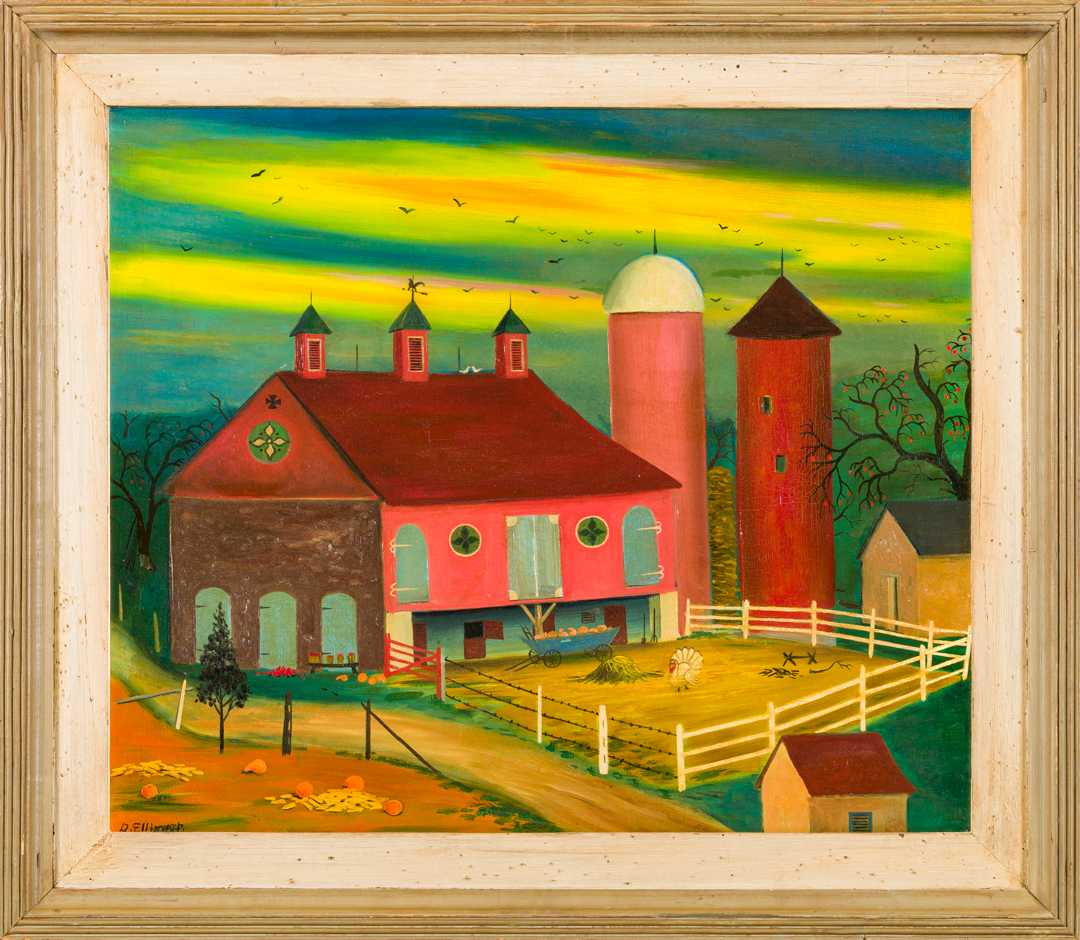
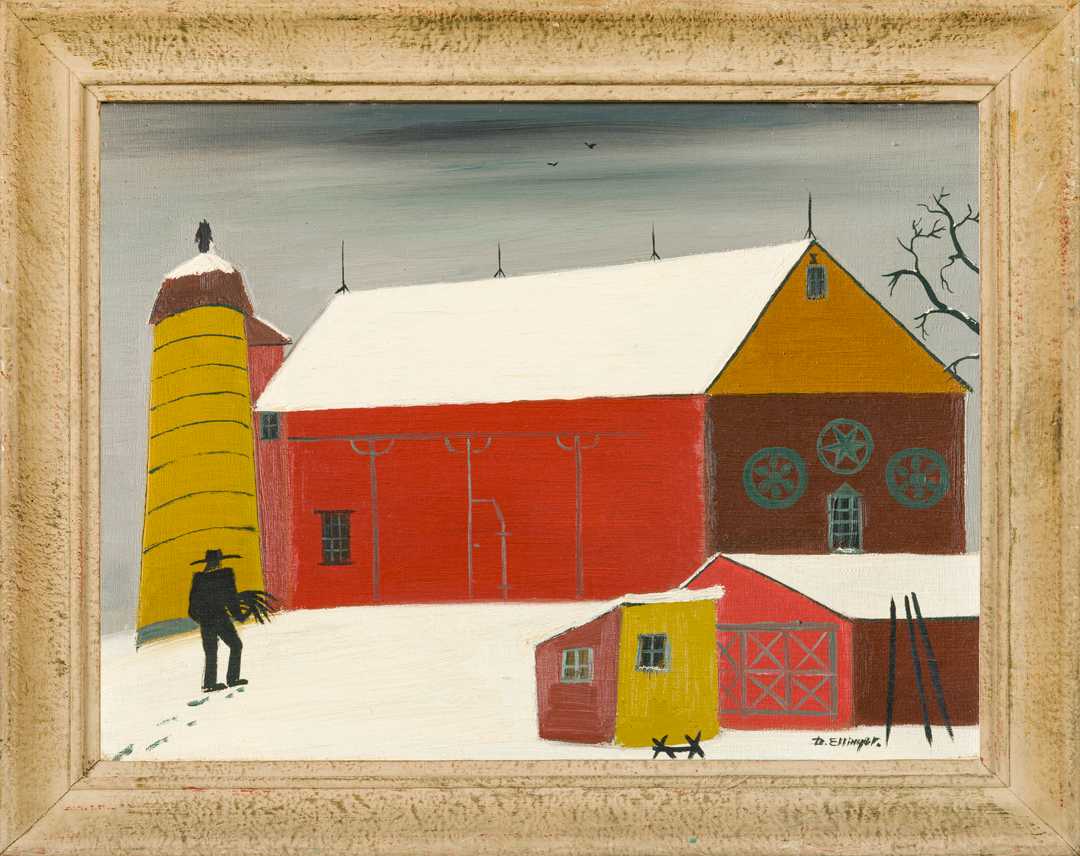
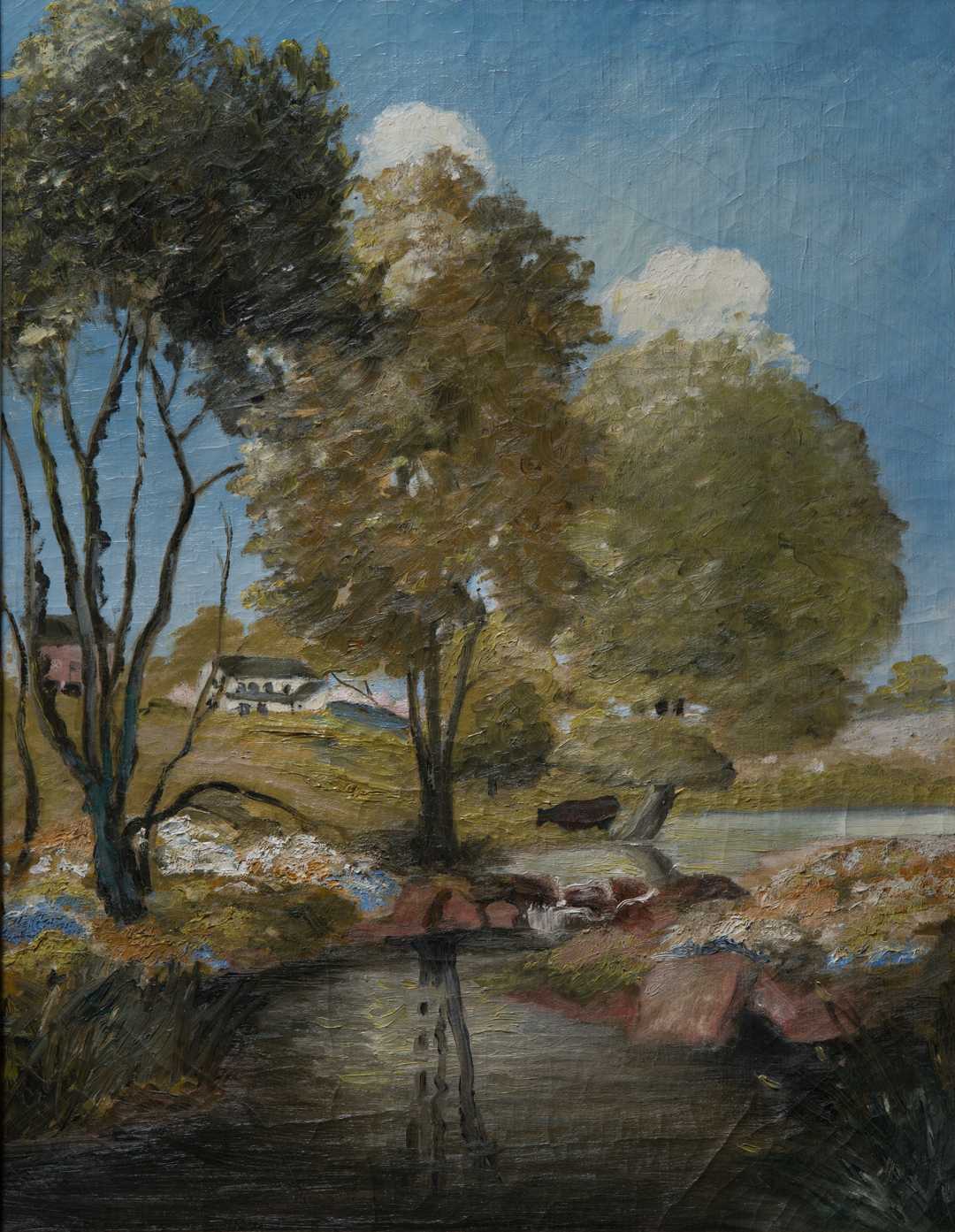
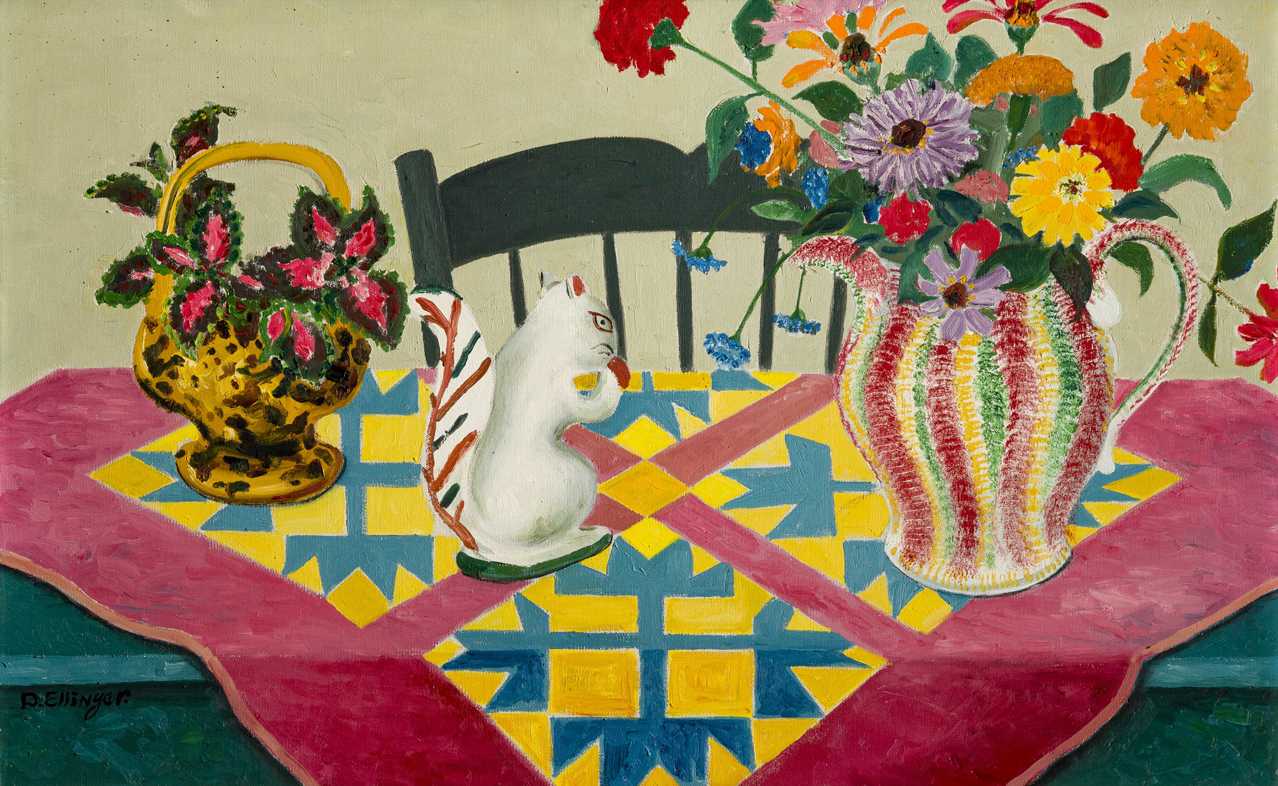









David Ellinger, "Amish Grace", watercolor, pencil and crayon on paper, collection of Dr. David Bronstein, photo: Michael E. Myers, Steadfast Imaging.
David Ellinger, "Lizzie’s Quilt", oil on canvas board, private collection, photo: Michael E. Myers, Steadfast Imaging.
David Ellinger, "Garden Path", c. 1940s, oil on canvas, collection of Dr. David Bronstein, photo: Michael E. Myers, Steadfast Imaging.
David Ellinger, "Last Bid End of Sale", oil on canvas board, collection of Rodney and Jessica Vanscavish, photo: Michael E. Myers, Steadfast Imaging.
David Ellinger, "Tobacco Barn" or "Yellow Barn", c. 1945, oil on canvas, Gratz Gallery & Conservation Studio, Doylestown, Pennsylvania, photo: Michael E. Myers, Steadfast Imaging.
David Ellinger, "Berks Co. Harvest Down Oley Way", oil on canvas, collection of Rodney and Jessica Vanscavish, photo: Michael E. Myers, Steadfast Imaging.
David Ellinger, "Feeding Time", oil on canvas, collection of Dr. David Bronstein, photo: Michael E. Myers, Steadfast Imaging.
David Ellinger, "Birchwood Farm", 1933, oil on canvas, collection of Historic Trappe, gift of Dr. Katharine Herrick Davis, photo: Gavin Ashworth Photography.
David Ellinger, "Spatter Pitcher Still Life", oil on canvas, collection of Dr. David Bronstein, photo: Michael E. Myers, Steadfast Imaging.
David Ellinger, "Amish Grace", watercolor, pencil and crayon on paper, collection of Dr. David Bronstein, photo: Michael E. Myers, Steadfast Imaging.
David Ellinger, "Lizzie’s Quilt", oil on canvas board, private collection, photo: Michael E. Myers, Steadfast Imaging.
David Ellinger, "Garden Path", c. 1940s, oil on canvas, collection of Dr. David Bronstein, photo: Michael E. Myers, Steadfast Imaging.
David Ellinger, "Last Bid End of Sale", oil on canvas board, collection of Rodney and Jessica Vanscavish, photo: Michael E. Myers, Steadfast Imaging.
David Ellinger, "Tobacco Barn" or "Yellow Barn", c. 1945, oil on canvas, Gratz Gallery & Conservation Studio, Doylestown, Pennsylvania, photo: Michael E. Myers, Steadfast Imaging.
David Ellinger, "Berks Co. Harvest Down Oley Way", oil on canvas, collection of Rodney and Jessica Vanscavish, photo: Michael E. Myers, Steadfast Imaging.
David Ellinger, "Feeding Time", oil on canvas, collection of Dr. David Bronstein, photo: Michael E. Myers, Steadfast Imaging.
David Ellinger, "Birchwood Farm", 1933, oil on canvas, collection of Historic Trappe, gift of Dr. Katharine Herrick Davis, photo: Gavin Ashworth Photography.
David Ellinger, "Spatter Pitcher Still Life", oil on canvas, collection of Dr. David Bronstein, photo: Michael E. Myers, Steadfast Imaging.

The Pew Center for Arts & Heritage is a multidisciplinary grantmaker and hub for knowledge-sharing, funded by The Pew Charitable Trusts, dedicated to fostering a vibrant cultural community in Greater Philadelphia. The Center invests in ambitious, imaginative, and catalytic work that showcases the region’s cultural vitality and enhances public life, and engages in an exchange of ideas concerning artistic and interpretive practice with a broad network of cultural practitioners and leaders.
